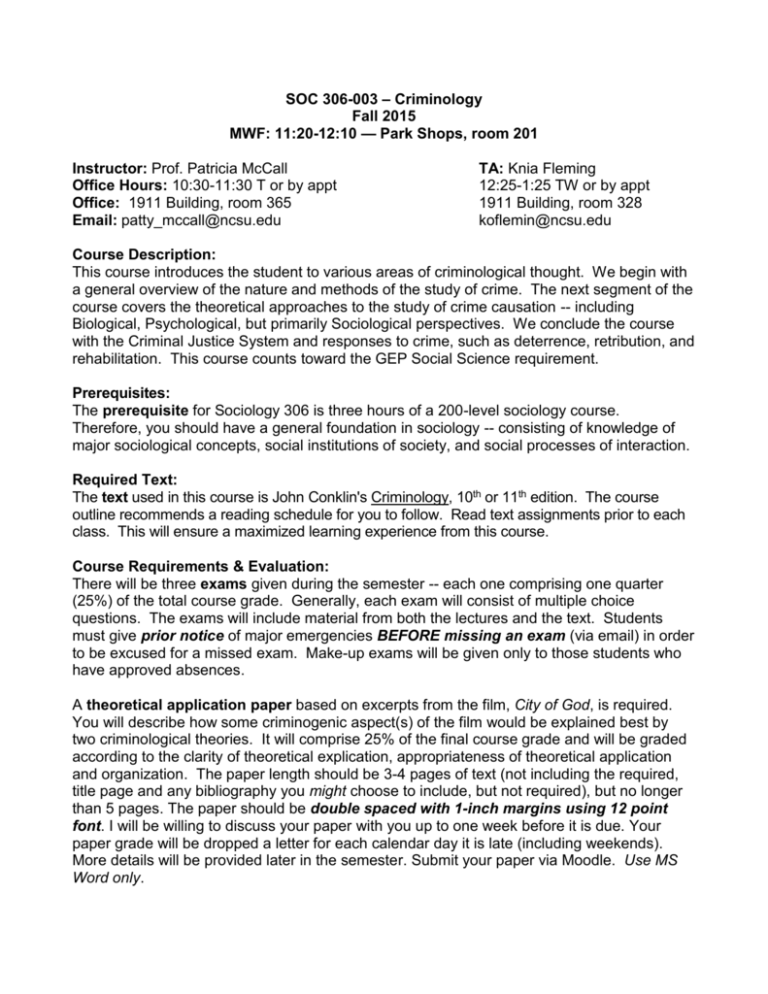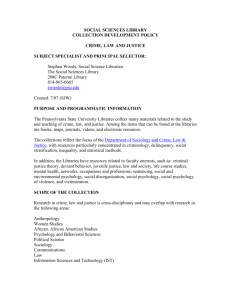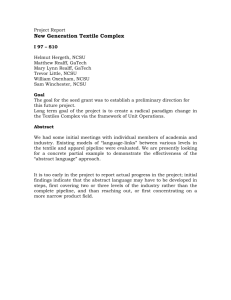Syllabus - North Carolina State University
advertisement

SOC 306-003 – Criminology Fall 2015 MWF: 11:20-12:10 — Park Shops, room 201 Instructor: Prof. Patricia McCall Office Hours: 10:30-11:30 T or by appt Office: 1911 Building, room 365 Email: patty_mccall@ncsu.edu TA: Knia Fleming 12:25-1:25 TW or by appt 1911 Building, room 328 koflemin@ncsu.edu Course Description: This course introduces the student to various areas of criminological thought. We begin with a general overview of the nature and methods of the study of crime. The next segment of the course covers the theoretical approaches to the study of crime causation -- including Biological, Psychological, but primarily Sociological perspectives. We conclude the course with the Criminal Justice System and responses to crime, such as deterrence, retribution, and rehabilitation. This course counts toward the GEP Social Science requirement. Prerequisites: The prerequisite for Sociology 306 is three hours of a 200-level sociology course. Therefore, you should have a general foundation in sociology -- consisting of knowledge of major sociological concepts, social institutions of society, and social processes of interaction. Required Text: The text used in this course is John Conklin's Criminology, 10th or 11th edition. The course outline recommends a reading schedule for you to follow. Read text assignments prior to each class. This will ensure a maximized learning experience from this course. Course Requirements & Evaluation: There will be three exams given during the semester -- each one comprising one quarter (25%) of the total course grade. Generally, each exam will consist of multiple choice questions. The exams will include material from both the lectures and the text. Students must give prior notice of major emergencies BEFORE missing an exam (via email) in order to be excused for a missed exam. Make-up exams will be given only to those students who have approved absences. A theoretical application paper based on excerpts from the film, City of God, is required. You will describe how some criminogenic aspect(s) of the film would be explained best by two criminological theories. It will comprise 25% of the final course grade and will be graded according to the clarity of theoretical explication, appropriateness of theoretical application and organization. The paper length should be 3-4 pages of text (not including the required, title page and any bibliography you might choose to include, but not required), but no longer than 5 pages. The paper should be double spaced with 1-inch margins using 12 point font. I will be willing to discuss your paper with you up to one week before it is due. Your paper grade will be dropped a letter for each calendar day it is late (including weekends). More details will be provided later in the semester. Submit your paper via Moodle. Use MS Word only. Grading Scale: A+ 97-100 A 94-96 A- 90-93 B+ 87-89 B 84-86 B- 80-83 C+ 77-79 C 74-76 C- 70-73 D+ 67-69 D 64-66 D- 60-63 F <60 Attendance is required. I reserve the right to deduct points from your final grade for excessive, unexcused absences. Statement on Academic Integrity: Violations may result in a failing grade for the course. If you have any questions about what constitutes academic integrity and the potential penalties incurred therein, ask the professor or TA, or consult: http://studentconduct.ncsu.edu/academic-integrity-an-overview and also see http://policies.ncsu.edu/policy/pol-11-35-01 Open Learning Environment: The intention and structure of university level courses are to provide open, thoughtful forums for a wide variety of topics. While discussing these topics, students shall not discriminate on the basis of “race, color, religion, creed, sex, national origin, age, disability or veteran status” as outlined in the University’s Unlawful Harassment Policy, available at: http://www.ncsu.edu/equal_op/ If you have a concern in this regard, please contact the Equal Opportunity Office at 515-3148, or contact the instructor. Physical or Learning Disabilities: Reasonable accommodations will be made for students with verifiable disabilities. In order to take advantage of available accommodations, students must register with Disability Services for Students at 1900 Student Health Center, Campus Box 7509, 515-7653, and have a letter provided to the instructor indicating what types of accommodations will be required. Please consult: http://www.ncsu.edu/provost/offices/affirm_action/dss . For more information on NC State’s policy on working with students with disabilities, please consult: http://policies.ncsu.edu/regulation/reg-02-20-01 CHASS Career Services for Humanities & SocSci Majors (University Career Center). Contact Woody Catoe and make appointments through ePACK – ncsu.edu/epack Course Schedule Topic & Assignment Tentative Dates Part I: Introduction to Criminology Chapter 1: The Study of Crime August 19 – 21 Topic & Assignment Tentative Dates Part II: The Extent and Nature of Crime Chapter 2: Measuring Crime August 24 – 31 Chapter 3: Crime and Its Costs Labor Day Holiday September 2 - 9 September 7 Chapter 4: Dimensions of Crime September 9 – 16 Review for Exam I Exam I September 16 September 18 Part III: The Causes of Criminal Behavior Chapter 5: Biological and Psychological Explanations of Crime September 21 – 25 Chapter 6: Social, Cultural & Economic Sources of Crime Film – Children of Violence Sept 28 - October 12 Sept. 30 – Oct. 2 Fall Break Chapter 7: Social Control and Commitment to the Law Chapter 8: Learning to Commit Crime October 9 October 14 – 23 October 23 – 30 Review for Exam II October 30 Exam II November 2 Chapter 9: Opportunities and Facilitating Factors Film – City of God (rated R for sex, violence ) November 4 - 9 November 4 - 6 Chapter 10: Criminal Careers November 9 - 13 Part IV: Reactions to Crime Chapter 13: The Criminal Justice System November 16 – 30 Theoretical Applications Paper Day—No Class—due 5:00pm November 18 Film –The New Gulag Thanksgiving Holiday November 20 November 25 - 27 Chapter 14: Deterrence, Incapacitation, Retribution & Rehabilitation Nov. 30 – Dec. 4 Review for Exam III Exam III December 4 December 9 (9-11am)







